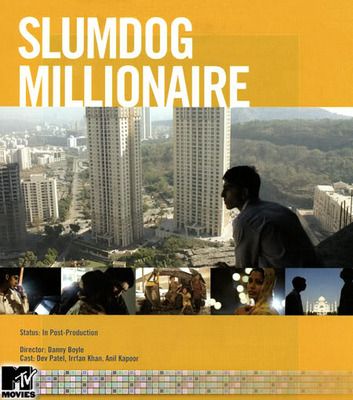
Slumdog Millionaire
2008
Director: Danny Boyle, Loveleen Tandan
Starring: Dev Patel, Freida Pinto, Anil Kapoor
The year that Slumdog Millionaire won Best Picture was a scant Oscar year for me. I was deeply entrenched in viewing older films and rarely came up for air by actually going to a current movie theater. The only nominated film for Best Picture that I had seen was Frost/Nixon, which I still think is a good film, if not a little lacking, and I was wincing over the exclusion of The Dark Knight from the nominations list. For some reason, I sort of mentally wrote off a lot of films from that year. For some reason, I was anticipating not enjoying Slumdog Millionaire.
I honestly don’t know why.
Because I enjoyed the heck out of it as I watched it just now.
Jamal Malik (Patel as an adult, Ayush Mahesh Khedekar and Tanay Chheda in flashbacks) is one question away from winning India’s Who Wants to Be a Millionaire? The police, however, are convinced that an uneducated boy from the slums has to be cheating in order to get so far. Jamal walks through every question he was asked on the show, flashing back to episodes in his life that explain how he knew the answer. All this is a pretext, however, for the real story, the grand opera of family, love, and betrayal involving Jamal’s brother Salim (Madhur Mittal, Azharuddin Mohammed Ismail, and Ashutosh Lobo Gajiwala) and his childhood friend Latika (Pinto, Rubina Ali, and Tanvi Ganesh Lonkar).
The very first thing that struck me when watching this was the opening. We see Jamal being interrogated by police, which intercuts with Jamal starting out on Who Wants to Be a Millionaire?. Did I say “interrogated?” Oh, excuse me, I should have said “tortured.” I think it was that moment when I woke up and realized this would be nothing at all like whatever I was vaguely anticipating. At the same time that the action was shaking me out of a bit of a stupor, I was mesmerized by the photography. Quick cuts, canted angles, blurred focus; it was awesome. I immediately saw the connection between Danny Boyle’s work here and his earlier Trainspotting.
In terms of the script, the film rather neatly follows a pattern of “police station – game show – flashback,” working through every question that Jamal was asked. The inspector yelling, “How did you know the answer?” to the TV host asking him the question, to a typically horrific tale of the streets clearly illustrating how Jamal knew whose face was on the $100 bill. It is the flashbacks to the streets that are the primary focus, and wow, are those flashbacks bleak. Those expecting a fun little romp in India are up to some major surprises, with almost all flashbacks taking place in wretched slums from which Jamal rises. The trash, the filth, the squalor are all shocking to someone like me who knows precious little about India. We have barely assimilated this horror when new horrors are heaped upon us in the actions of those living under such conditions. Jamal has a hard life; being beaten is to be expected, and far preferable to some of the other atrocities we see committed in the film. Disney film, this ain’t.
The outline of the film starts to become clear in the second half as Jamal’s brother Salim embarks on a life of crime while Jamal breaks from him. I cannot say just how many times this idea has been played out in one form of another: the ascent of one character paralleling the descent of another is incredibly popular in everything from song to soap opera. While this may not be anything new, Slumdog Millionaire certainly does it in grand operatic fashion, bordering on melodrama. This is where the atrocities mentioned above start to wane and the film starts feeling more like a conventional novel and less like Italian neo-realism. Luckily, Boyle’s brilliant camerawork manages to keep the drama tightly wound and running well; I never felt as if the film succumbed to any sort of overly weepy maudlin pretensions, even if I do feel that the first half of the movie is stronger than the second, more predictable half.

The love story between Latika and Jamal is the driving force for Jamal’s journey in the film, but it never wholly connected for me. I felt as though they had an honest connection, but one that was far more that of deep friendship, not love. When, while growing up, Jamal confesses his love for Latika, I honestly felt surprised. They are much more brother and sister than lovers. The relationship between Jamal and Salim, on the other hand, despite the rise versus fall that occurs in the second half, felt more nuanced and more complicated, as there are clear bonds of love existing between them despite any arguments they may have. I enjoyed that relationship far more than the more superficial love story.
Looking back on Slumdog Millionaire, the only question I can raise against it is that of intent. Ultimately, its message is “feel good,” and the film ends on a distinct upper. What do I remember from the film? I remember the final somewhat inexplicable yet inevitable dance number in the train station and I remember the joyous, upbeat ending to the plot. But if I allow myself a second remembrance, I then think of some of the horrible scenes of poverty, of wretched acts done against helpless children, and that’s where I start to wonder. What does the movie want me to remember? In a way, I feel that the upbeat ending, though enjoyable, detracts from the harsh realities of life in India. Perhaps I’m expecting too much of it, though. After all, The Shawshank Redemption has horrible stuff in it but ends on an upper. I’m still undecided on this point, in case you can’t tell.
Overall, Slumdog Millionaire is a classic story told in a breathlessly modern way. In the hands of another director, this could have been such a crappy movie, but it's not. I was thoroughly entertained from start to finish.
Arbitrary Rating: 9/10
Awesome. So happy you liked this one. Like you, I think it suffers from predictability at the end (I never really felt like anything was in doubt). I enjoyed the episodic nature of the tale, the backstory for each question, and how everything ultimately tied together.
ReplyDeleteBelieve it or not, I even liked the musical number at the end.
I really liked the pattern of the film as well. I thought it was clever. I think you mentioned in your review of this that anyone who knows "The Three Musketeers" will have no doubt as to the ending, and "The Three Musketeers" is one of my all-time favorite novels, so there was no "suspense" in the finale for me.
DeleteWOW, you even liked the musical number! I'm impressed!
Actually the music number in the end is perfect.
ReplyDeleteWhen Slumdog Millionaire came out it was called in Indian movie, but the Indians protested. This was not an Indian movie at all. It was a Western movie about India.
An Indian movie, a true Bollywod Indian movie, is about impossible love, divine intervention, absurdly complex events and always, always a happy end where everybody starts singing and dancing in a big formation.
Compare this with Slumdog Millionaire. All the ingredients are there from a Bollywood movie, but done Western style. So of course we must have the singing and dancing in the end.
I very much agree with you; this definitely felt like a story set in India but told using Western sensibilities.
Delete